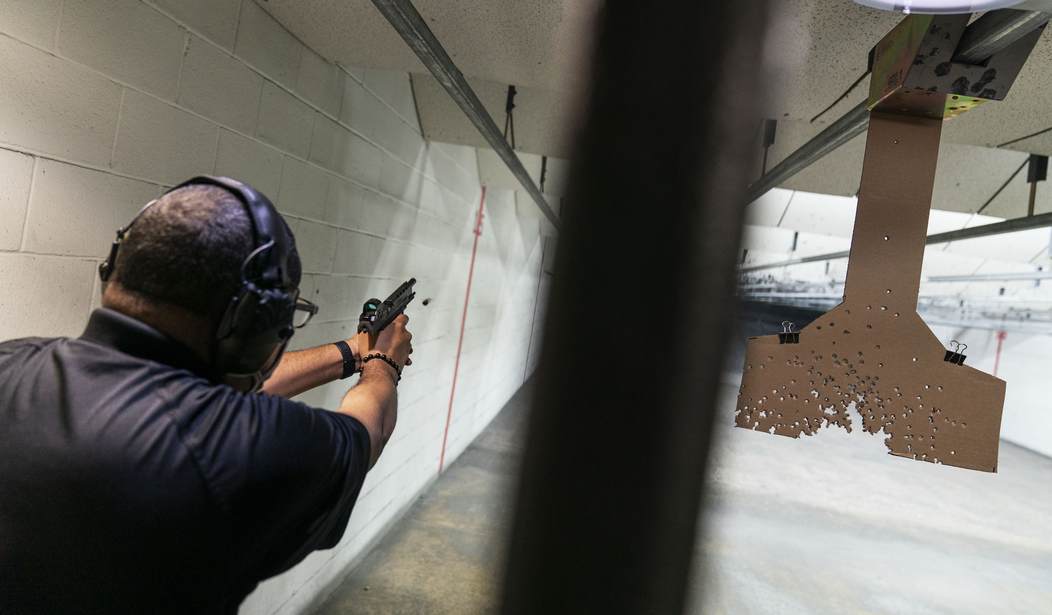For lying on her federal income tax returns, Lisa Folajtar got three years of probation and a lifetime of constitutional disability. Because her crime carried a maximum penalty of three years in prison, she was permanently stripped of her Second Amendment right to keep and bear arms.
In a case that could give the Supreme Court an opportunity to elucidate the Second Amendment's restrictions on firearm laws for the first time in more than a decade, the U.S. Court of Appeals for the 3rd Circuit recently rejected Folajtar's challenge to the federal ban on gun possession by people with felony records. The dissent echoed the position staked out by the Court's newest justice, Amy Coney Barrett, as a 7th Circuit judge, saying that disqualification is not just unfair but unconstitutional.
Folajtar, who also paid a $10,000 fine and $250,000 in back taxes, argued that she should not have lost her constitutional right to armed self-defense because there was no reason to think she posed a threat to public safety. Two members of a three-judge 3rd Circuit panel disagreed, saying the Second Amendment is limited to "virtuous" citizens, a category from which Folajtar was forever expelled when she cheated on her taxes.
Although that view has been endorsed by several federal appeals courts, Judge Stephanos Bibas said, in his 27-page dissent, it is at odds with the original public understanding of the Second Amendment. He argued that "the historical touchstone" for disarming felons is "danger, not virtue."
Barrett reached the same conclusion in a 2019 case involving a man named Rickey Kanter, who lost his Second Amendment rights after he was convicted of mail fraud. While history "demonstrates that legislatures have the power to prohibit dangerous people from possessing guns," she wrote in a 37-page dissent, "that power extends only to people who are dangerous."
Recommended
Barrett emphasized that "founding-era legislatures did not strip felons of the right to bear arms simply because of their status as felons." The number of crimes classified as felonies has expanded dramatically since then, making the connection between that category and an assumption of violent tendencies even more tenuous.
Barrett noted that modern-day felonies include "everything from Kanter's offense, mail fraud, to selling pigs without a license in Massachusetts, redeeming large quantities of out-of-state bottle deposits in Michigan, and countless other state and federal offenses." Bibas, who drew on Barrett's historical research in his dissent, made the same point.
"A radio talk show host can become a felon for uttering 'any obscene, indecent, or profane language by means of radio communication,'" Bibas noted. "Opening a bottle of ketchup at the supermarket and putting it back on the shelf" is a felony in New Jersey, he added, and so is "reading another person's email without permission" in Pennsylvania.
In Oklahoma, adultery is a felony; other states classify it as a misdemeanor or do not treat it as a crime at all. "The Second Amendment right to keep and bear arms should not hinge on such arbitrary, manipulable distinctions," Bibas wrote.
In the landmark Second Amendment case District of Columbia v. Heller, the Supreme Court said "nothing in our opinion should be taken to cast doubt on longstanding prohibitions on the possession of firearms by felons and the mentally ill." But as Bibas pointed out, neither issue was before the Court, so Heller did not resolve them -- a point the 7th Circuit conceded last year.
Furthermore, the prohibition to which Folajtar and Kanter objected is of relatively recent vintage. "The federal felon-in-possession ban," Bibas noted, "did not begin to reach beyond violent crimes until 1961."
Since 2010, when the Court ruled that the Second Amendment imposes limits on state and local as well as federal gun control laws, it has passed up many opportunities to clarify the extent of those limits, an abdication that has troubled five of the current justices, including Barrett. This case gives the Court a chance to rectify its neglect.
Jacob Sullum is a senior editor at Reason magazine. Follow him on Twitter: @JacobSullum.

























Join the conversation as a VIP Member